Make a batch of flavorful bagels filled with raisins and ground cinnamon. This sweet cinnamon raisin bagel recipe is packed with flavor!
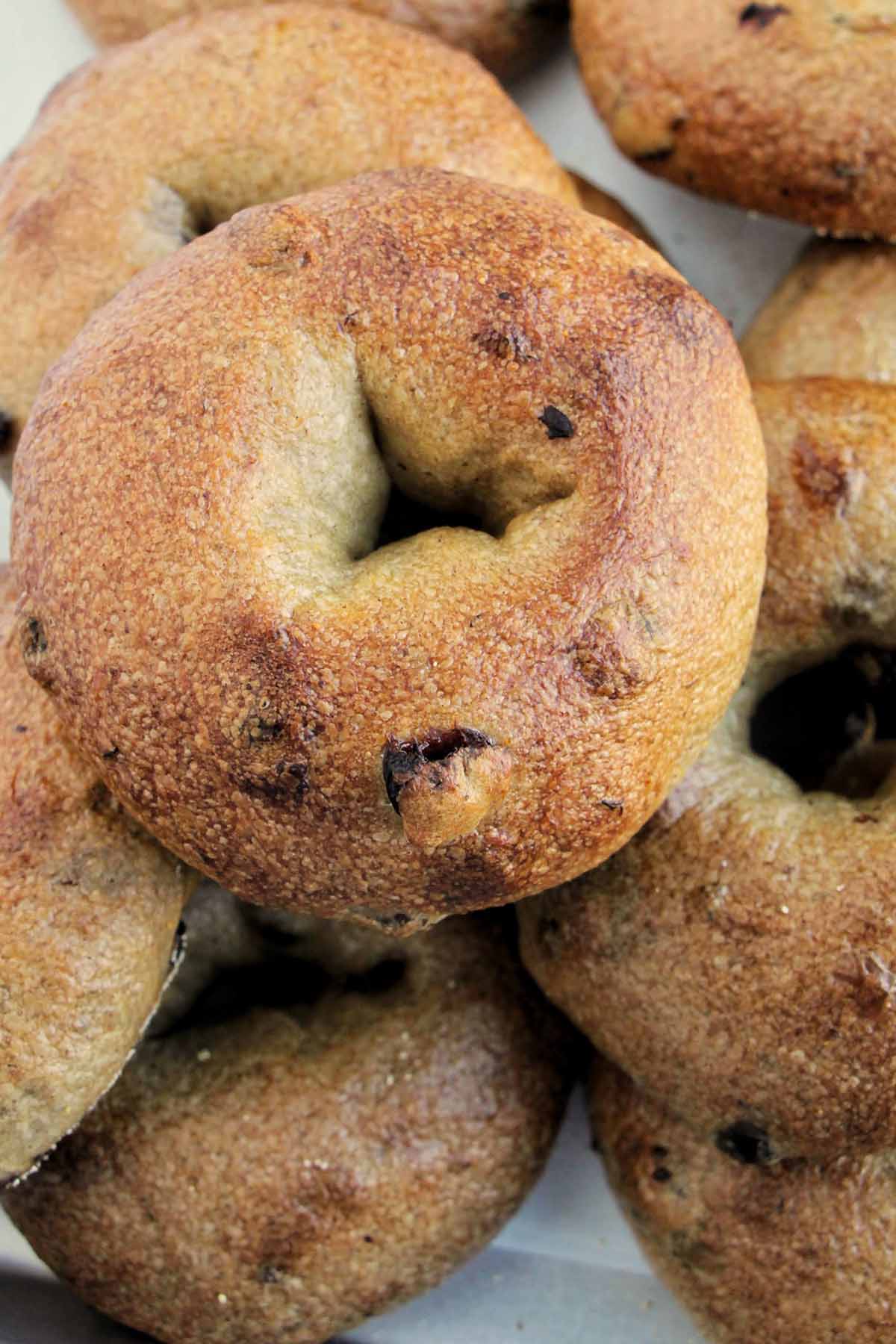
Want To Save This Article?
Enter your email below and we'll send it straight to your inbox. Plus, you'll receive new weekly recipe inspiration.
I love making homemade bagels! I've developed many different bagel recipes including salt bagels, cheddar cheese, and everything bagels.
My love of bagels led me to develop a recipe for cinnamon and raisin bagels. This variety is flavored by ground cinnamon and filled with pops of sweet raisins.
If you enjoy sweet bagel recipes, don't forget to also check out my cinnamon sugar bagel recipe.
Jump to:
What You'll Learn In This Recipe
- A step-by-step guide on how to make bagel dough with a raisin inclusion.
- Why an overnight proof is so important for bagels.
- Helpful tips and tricks for baking high-quality bagels (after making over 1,000 bagels at home).
Want to continue improving your bread baking skills? Grab my free eBook with 12 secrets to help you make the best bread of your life!
Ingredients You Need
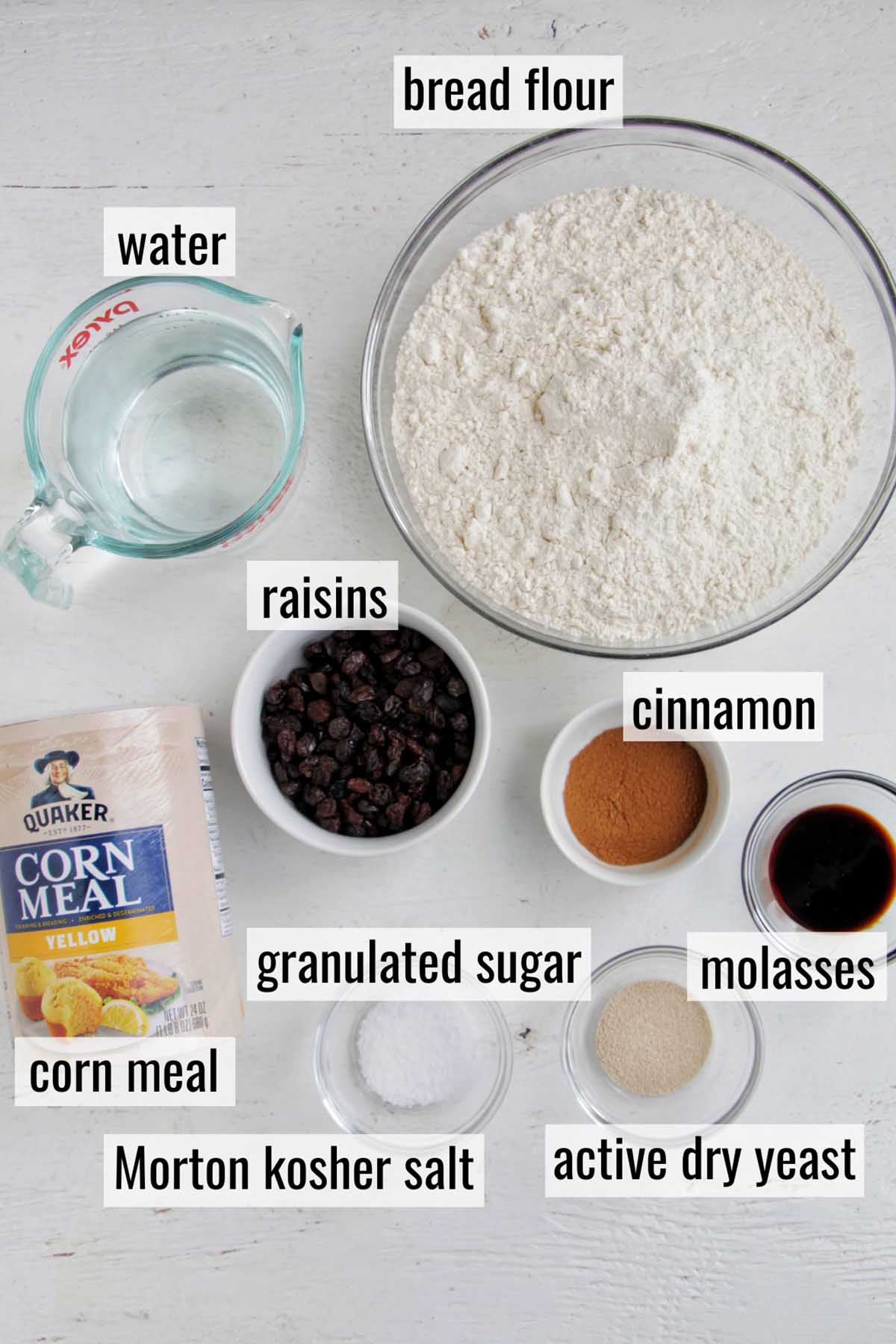
- Water: For the water in this recipe, heat it slightly to 110°F or 43°C before beginning the dough.
- Molasses: Many classic New York bagels use barley malt. However, this ingredient can be difficult to find in grocery stores. I've found that molasses is a great substitute and results in a crusty bagel with great flavor and texture.
- Active dry yeast: Don't use instant yeast in this recipe. The bagel dough needs to sit overnight in the fridge, which means we need a longer-lasting yeast.
- Bread flour: I always use bread flour for bagels which gives them a chewy texture. Bread flour has a higher protein content (13.5% to 14.5% compared to all-purpose flour which only has 9.5% to 11.5%), so don't be tempted to substitute with all-purpose flour.
- Morton kosher salt: Bread recipes need quite a bit of salt in order to have great flavor. I do not recommend using table salt.
- Cornmeal: This ingredient helps ensure the bagel dough doesn't stick to the pans.
- Granulated sugar: We're using a small amount of sugar to sweeten the bagels. This also gives them a nice, golden brown color while baking, thanks to the Maillard reaction.
- Raisins and cinnamon: Both of these ingredients are incorporated into the dough. They add great flavor!
Check out the recipe card below for the specific measurements and instructions.
How To Make This Recipe
Let me teach you how to make cinnamon raisin bagels with the help of this step-by-step guide.

1. Before we begin making the dough, soften the raisins. Add the raisins to a bowl with boiling water. Allow the raisins to soak for 10 - 15 minutes until they are fully softened. Finally, drain the raisins and pat dry.
Next, add warm water, molasses, and yeast to a small bowl and whisk together until dissolved. Allow the mixture to sit until it’s foamy on top.
2. Whisk together flour, granulated sugar, ground cinnamon, and salt in a stand mixer bowl. Then, slowly combine the water and yeast mixture with the flour on low speed, just until a shaggy dough forms. Scrape down the sides, add raisins, then increase speed to medium as needed, until the majority of the loose flour is incorporated into the dough.
If you don't have a mixer, don't worry! I have notes in the recipe card below about how to hand-mix this dough.
3. Increase the speed to medium-high, and set a timer for 10 minutes to allow the dough to knead. This step is important because the act of kneading the flour with water helps the gluten to form. This is what will give your bagels great crumb and texture.
The dough is done kneading when it is flexible and bouncy to the touch.
4. Roll the dough into a tight ball, then place it in a clean bowl and cover it with plastic wrap. Allow the dough to rise in a warm, draft-free place until doubled in size. It usually takes about 60 minutes in my kitchen, but the rise time can vary depending on the temperature of your environment.
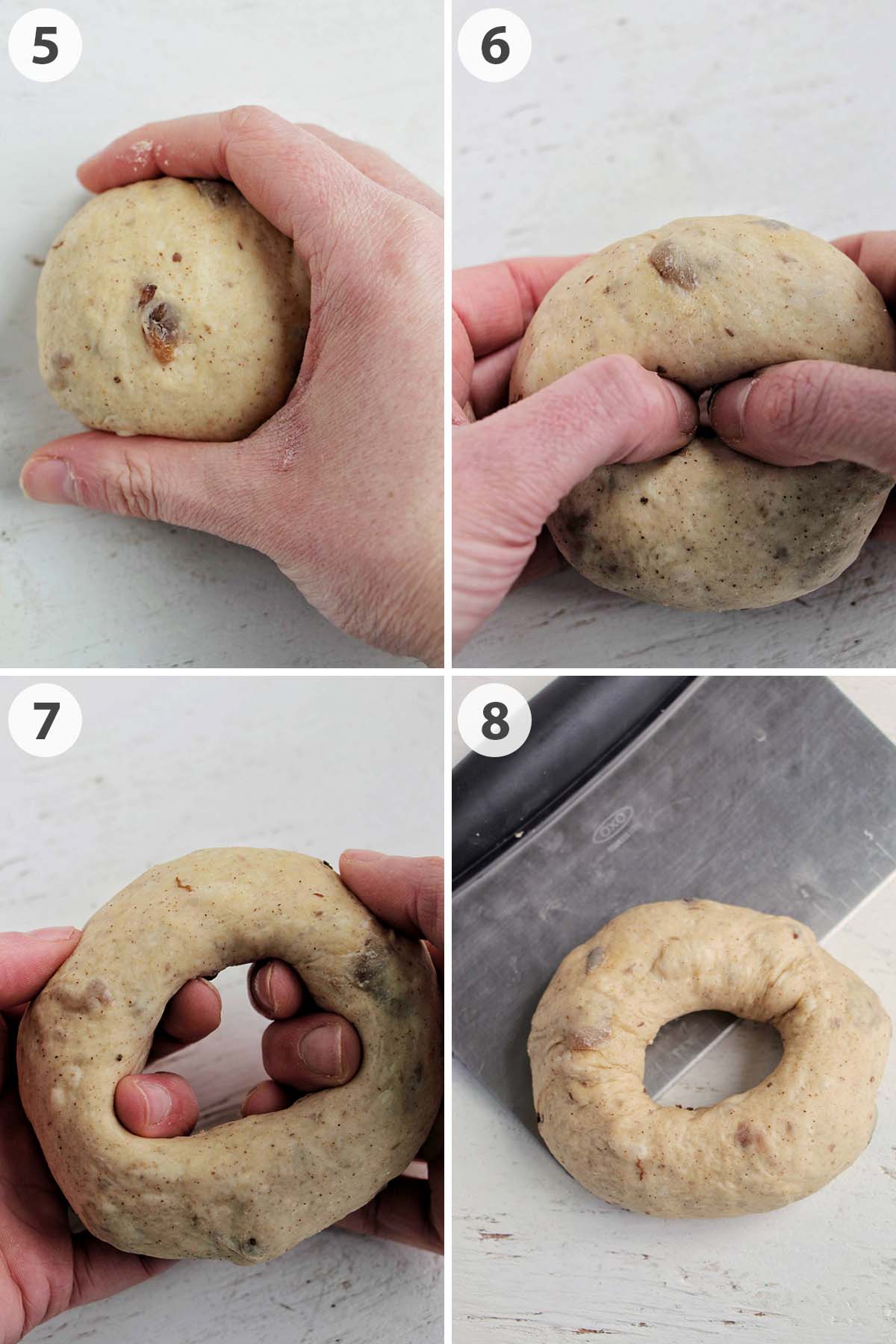
5. On a clean, un-floured surface, remove the dough from the bowl. Using a bench scraper or knife, divide the dough into 12 pieces weighing 4.5 ounces (127 grams).
Next, it's time to shape the bagels. Be sure to work with only one piece of dough at a time and keep the others covered with a towel to ensure the dough doesn't dry out. To shape the bagels, first roll the dough into a ball.
6. Push through the center of the ball using both thumbs to make a hole.
7. Then, continue to stretch the bagel out until it reaches about 4 inches (10 cm) across.
8. Be sure not to flatten the bagel too much throughout this process. Place completed bagels about 2 inches (5 cm) apart on a baking sheet that has been generously sprinkled with cornmeal.
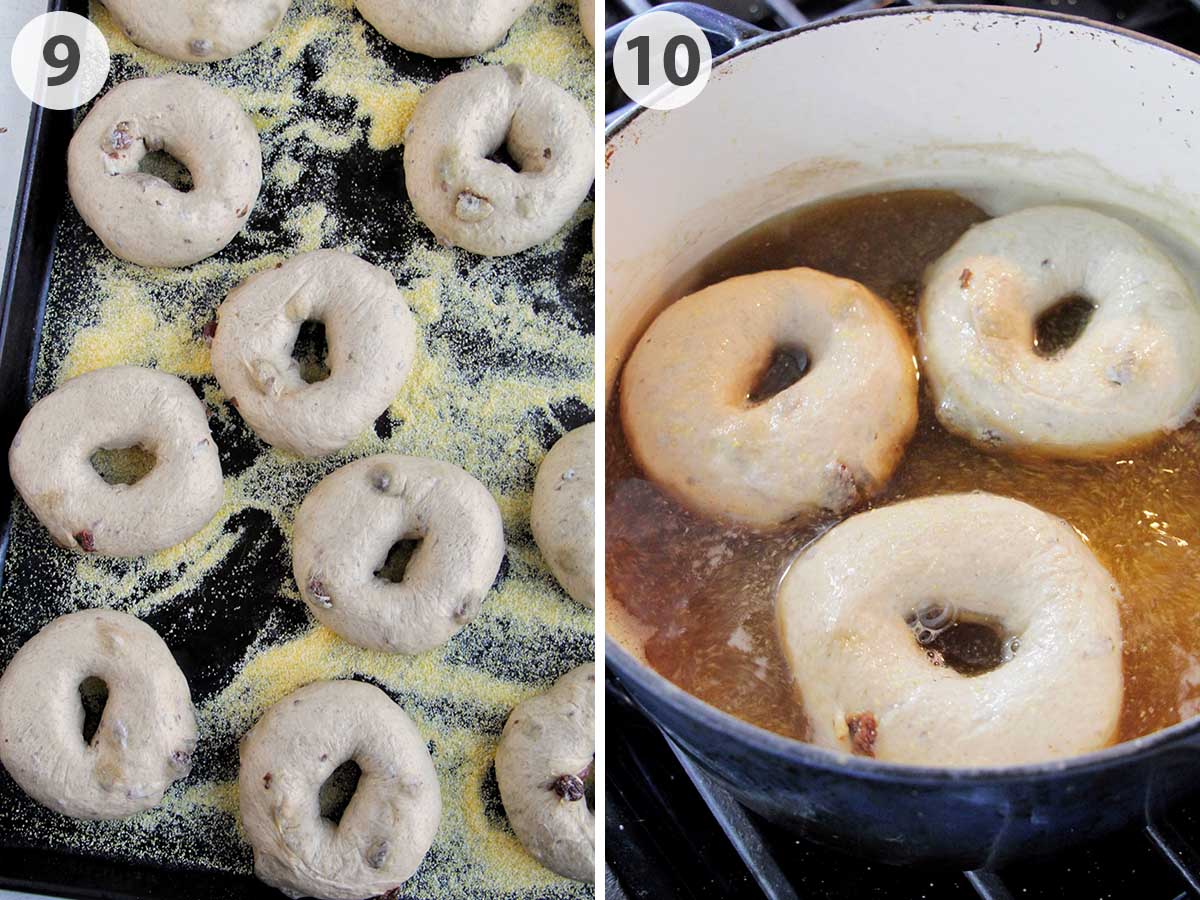
9. Securely cover the bagels with plastic wrap so no air can get into the baking sheet. Allow the dough to proof overnight in the refrigerator for 12 - 18 hours. Proofing is the final rise before baking, and it gives the bagels time to slowly ferment and gain additional flavor.
10. Fill a large pot halfway full of water. Place over high heat to boil. Once the water is at a rolling boil, add in molasses, a tablespoon at a time, until the water is dark brown.
Allow the bagels to boil for 30 seconds on the first side, then flip and boil for an additional 30 seconds on the second side.
Finally, bake the bagels for 15 -19 minutes on hot pizza stones that have been preheated in the oven.
Expert Tips
- Storage: You can store the bagels for up to 4 days in an airtight container at room temperature. I suggest toasting to reheat. Bagels can also be frozen for up to 6 months in the freezer. Slice them in half before you freeze them. Then, you can pop the frozen bagel straight into the toaster. You can find even more tips for storing bagels.
- Don't have a mixer but still want to make these cinnamon raisin bagels? No problem! Check out the hand-kneading instructions in the notes section of the recipe card.
- It's really important to fully knead the dough until the proper amount of gluten has formed. This is an integral part of the bagel making process, so don't cut the kneading time short!
Troubleshooting FAQs
There are a few common reasons your bagels are turning out flat:
1. Be careful when handling the dough. After the bagels have been proofed overnight in the refrigerator, they are full of air. Be sure to carefully handle the bagels to avoid pushing the air out. Using a bench scraper to move the bagels will help with this issue.
2. Check that the bagels have not proofed in the refrigerator for too long. If the bagels are overproofed, the dough will start to flatten and they won't retain proper air. The same can happen during the bulk fermentation stage if you allow the dough to rise for too long and it more than doubles in size.
3. Don't open the oven door while the bagels are baking (except to rotate the pans halfway through baking). Oven spring, which is the final burst of rising that happens when the bagels are placed in the oven to cook, helps ensure your bagels are tall and fluffy. If you open the oven during the first few minutes of baking, you could hinder the oven spring resulting in flat bagels.
Here are a few reasons your bagels are dense:
1. Don't open the oven door while the bagels are baking (except to rotate the pans halfway through baking). Oven spring, which is the final burst of rising that happens when the bagels are placed in the oven to cook, helps ensure your bagels are tall and fluffy. If you open the oven during the first few minutes of baking, you could hinder the oven spring resulting in dense bagels.
2. The bagel dough rose too much during the bulk fermentation stage or proofed too long in the refrigerator. If this happens, the dough will lose its elastic and bouncy texture, which will cause it to become dense.
3. Be sure you properly mixed the dough during the kneading stage. It's important that gluten has formed during this stage. To check that the dough is ready, grab a piece of dough between your fingers, stretch it, and see if web fibers have developed. You should be able to pull the dough thin enough that light shines through. If your dough rips as soon as you start pulling, you need to continue kneading the dough. You want the dough to be able to stretch rather than tear.
Don't boil the bagels for too long or they can become overly chewy and tough. It's best to boil the bagels for just 30 seconds on each side.
Overcooking the bagels can also cause them to become chewy and tough. I've found that baking my bagels at 450°F (230°C) for 15 - 19 minutes gives the bagels a golden brown color with the perfect amount of chew.
Check that your oven is properly heating. I like to use an oven thermometer to ensure that my oven is reaching 450°F (230°C). Allow both the oven and the pizza stone to preheat for at least 30 minutes to ensure it's properly heated.

More Bagel Recipes
Love this recipe? Please leave a 5-star ⭐⭐⭐⭐⭐ rating in the recipe card below. Don't forget to follow along on Instagram, Facebook, YouTube, and Pinterest for more recipes.

Cinnamon Raisin Bagels
Equipment
- kitchen scale
- bench scraper or knife
- pizza stone
- large pot or dutch oven
- slotted spoon or spider strainer
- wire rack
Ingredients
- ¾ cup raisins
- 2 cups plus 2 tablespoons lukewarm water (110°F or 43°C)
- 1 tablespoon, plus several tablespoons for boiling molasses
- 2 teaspoons active dry yeast
- 7 cups bread flour
- 3 tablespoons granulated sugar
- 1 tablespoon ground cinnamon
- 2 teaspoons Morton kosher salt
- cornmeal for dusting
Instructions
- Add raisins in a medium sized bowl and top with boiling water just until covered. Allow raisins to soak for 10 - 15 minutes until fully softened. Drain raisins and pat dry.
- Add warm water, 1 tablespoon (17 grams) molasses, and yeast to a small bowl and whisk together until dissolved. Allow the mixture to sit until it’s foamy on top, about 5 minutes.
- Whisk together flour, granulated sugar, ground cinnamon, and salt in a stand mixer bowl. Fit stand mixer with the dough hook attachment (see notes below for hand kneading instructions). Combine the water and yeast mixture with the flour on low speed, just until a shaggy dough forms. Scrape down the sides, add raisins, and increase speed to medium as needed, until the majority of the loose flour is incorporated into the dough. Once a shaggy dough is formed, increase the speed to medium high, and set a timer for 10 minutes to allow the dough to knead. During this time, keep an eye on your stand mixer to ensure it doesn’t wiggle off the counter or overheat. If at any point your mixer becomes too hot, take a break or begin hand kneading (see notes). The dough is done kneading when it is flexible and bouncy to the touch. To check that the dough is ready, grab a piece of dough between your fingers, stretch it, and see if web fibers have developed. You should be able to pull the dough thin enough that light shines through. If your dough rips as soon as you start pulling, you need to continue kneading the dough. You want the dough to be able to stretch rather than tear.
- Roll the dough into a tight ball, then place it in a clean bowl and cover with plastic wrap. Allow the dough to rise in a warm, draft-free place until doubled in size, about 60 - 90 minutes. Rise time will vary depending on the temperature of your environment.
- While the dough is rising, prepare two baking sheets generously sprinkled with cornmeal. Set aside.
- Punch down the risen dough a few times to release some of the gas that formed. On a clean, un-floured surface, remove the dough from the bowl. Using a bench scraper or knife, divide the dough into pieces weighing 4.5 ounces (127 grams).
- Working with one piece of dough at a time, and keeping the others covered with a tea towel, roll the dough into a ball. Push through the center of the ball using both thumbs to make a hole. Then, continue to stretch the bagel out until it reaches about 4 inches (10 cm) across. Be sure not to flatten the bagel too much throughout this process. Place completed bagels about 2 inches (5 cm) apart on the previously prepared baking sheets, and cover with plastic wrap. Repeat until all pieces of the dough have been shaped.
- Securely cover the bagels with plastic wrap so no air can get into the baking sheet. Allow dough to proof overnight in the refrigerator for 12 - 18 hours.
- Arrange the oven racks to the upper and lower thirds of the oven. Place a pizza stone on each of the racks, then heat oven to 450°F (230°C). Allow the oven and pizza stones to preheat for at least 30 minutes.
- Fill a large pot or dutch oven about halfway full with water. Place over high heat to boil. Once the water is at a rolling boil, add in molasses, a tablespoon at a time, until the water is dark brown.
- Remove the bagels from the refrigerator. They will have puffed up slightly overnight. Gently place as many bagels into the boiling water as will comfortably fit without over crowding the pot or dutch oven. Allow the bagels to boil for 30 seconds on the first side, then flip and boil for an additional 30 seconds on the second side. Using a slotted spoon, remove the bagel from the boiling water and place on a wire rack to cool. Repeat until all of the bagels have been boiled.
- Carefully, remove the hot pizza stones from the oven. Transfer the cornmeal from the original baking sheets to the hot pizza stone to prevent sticking. Place bagels on the stone about 2 inches (5 cm) apart. Bake for 15 -19 minutes, rotating the pans halfway through baking, until bagels are golden brown and shiny on top. Keep an eye on your bagels (without opening the oven door) to ensure they're not getting too dark. Remove from the oven and let cool completely on a wire rack.







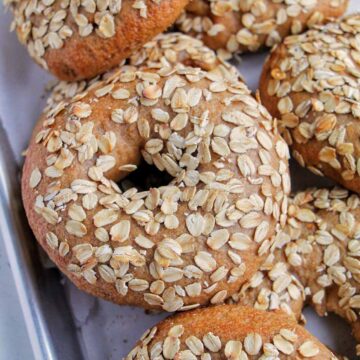


Leave a Reply